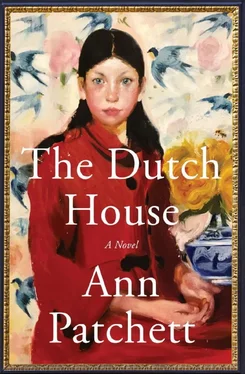“Why would he have done that?” Maeve had asked me that night after dinner when we were in her bedroom. Our father never took Maeve to collect the rent, even though she was seven years older than me and had won the math prize in school every year and would have been so much better with the ledger it was ridiculous. On the first Saturday of every month, after we’d been excused from the table and our father had gone to the library with his drink and the paper, Maeve would pull me into her bedroom and close the door. She wanted a recounting of the entire day, blow by blow: what had happened at every apartment, what the tenants had said, and what our father had said to them in return. She even wanted to know what we’d bought for lunch at Carter’s Market where we always stopped for sandwiches.
“The kid was really sick, that’s all. He didn’t open his eyes once, not even when Dad put him in the car.” When we got to the hospital, my father had told me to go to the men’s room and wash my hands, to get the water hot and use soap even though I hadn’t touched the boy.
Maeve mulled this over.
“What?” I asked.
“Well, think about it. He hates sick people. Has he ever so much as crossed the door of your room when you were sick?” She stretched out on the bed beside me, fluffing the pillow under her head. “If you’re going to put your feet on my bed then the least you can do is take off your filthy shoes.”
I kicked off my shoes. Did he sit on the edge of my bed and put his hand on my forehead? Did he bring me a ginger ale, ask me if I felt like I was going to throw up again? That’s what Maeve did. That’s what Sandy and Jocelyn did when Maeve was at school. “He never comes in my room.”
“But why would he have done all that if the boy’s father was there?”
I almost never got to an answer before Maeve did but in this case it was perfectly obvious. “Because the mother wasn’t there.” If there had been a woman in the apartment he never would have put himself in the middle of things.
Mothers were the measure of safety, which meant that I was safer than Maeve. After our mother left, Maeve took up the job on my behalf but no one did the same for her. Of course Sandy and Jocelyn mothered us. They made sure we were washed and fed and that our lunches were packed and our scouting dues paid. They loved us, I know they did, but they went home at the end of the day. There was no crawling into bed with Sandy or Jocelyn when I had a bad dream in the middle of the night, and it never once occurred to me to knock on my father’s door. I went to Maeve. She taught me the proper way to hold a fork. She attended my basketball games and knew all my friends and oversaw my homework and kissed me every morning before we went our separate ways to school and again at night before I went to bed regardless of whether or not I wanted to be kissed. She told me repeatedly, relentlessly, that I was kind and smart and fast, that I could be as great a man as I made up my mind to be. She was so good at all that, despite the fact that no one had done it for her.
“Mommy did it for me,” she said, surprised that I’d even brought it up. “Listen, kiddo, I was the lucky one. I got years with her and you didn’t. I can’t even think about how much you must miss her.”
But how could I miss someone I’d never known? I was only three at the time, and if I knew what was happening I had no memory of it. Sandy was the one who told me the whole story, though parts of it I knew of course from my sister. Maeve had been ten when our mother first started to leave. One morning Maeve got out of bed and opened the drapes over the window seat to see if it had snowed during the night and it had. Say what you will for the Dutch House, it was freezing. There was a fireplace in Maeve’s bedroom and Sandy kept dry wood on the grate above a bed of crumpled newspaper so that in the morning all Maeve had to do was strike a match, something she had been allowed to do since her eighth birthday. (“Mommy gave me a box of matches for my eighth birthday,” she told me once. “She said her mother had given her a box of matches when she turned eight, and they spent the morning learning how to strike them. She showed me how to light the fire, and then that night she let me light the candles on my cake.”) Maeve lit the fire and put on her robe and slippers and came next door to my room to check on me. I was three, still asleep. I had no part in this story.
Then she crossed the hall to our parents’ room and found it empty, the bed already made. Maeve went back to her room to get ready for school. She had brushed her teeth and washed her face and was halfway dressed when Fluffy came in to wake her up.
“Every morning you beat me,” Fluffy said.
“You should wake me up earlier,” Maeve said.
Fluffy told her she didn’t need to get up any earlier.
The fact that our father had already left the house wasn’t unusual. The fact that our mother wasn’t in the house was unusual but not without precedent. Sandy and Jocelyn and Fluffy all seemed to be themselves. If they weren’t worried there was no reason to worry. Our mother was the one who took Maeve to school but on this morning Fluffy drove her, letting her out with the lunch that Jocelyn had packed. At the end of the day Fluffy was there to pick her up again. When Maeve asked where our mother was, she shrugged. “With your father, maybe?”
Our mother wasn’t there for dinner that night, and when our father appeared, Maeve asked him where she’d gone. He wrapped her up in his arms and kissed her neck. Such things still happened in those days. He told Maeve her mother had gone to Philadelphia to visit old friends.
“Without saying goodbye?”
“She said goodbye to me,” our father said. “She got up very early.”
“I was up early.”
“Well, she was up even before you, and she told me to tell you she’d see you in a day or two. Everybody needs a vacation.”
“From what?” Maeve asked, when what she meant was, From me? From us?
“From the house.” He took her hand and walked her in to dinner. “This place is a big responsibility.”
How big of a responsibility could it have been when Jocelyn and Sandy and Fluffy did so much of the work, when the gardeners came to take care of the lawn and rake the leaves and shovel the snow, when Maeve would have done anything in the world to be helpful?
Our mother wasn’t there when Maeve woke up the next morning, and again Fluffy drove her to school and picked her up. But when they came back to the house on that second day, our mother was sitting in the kitchen drinking tea with Sandy and Jocelyn. I was playing on the floor, taking the lids off all the pots.
“She looked so tired,” Maeve told me. “She looked like she hadn’t been to sleep the whole time she’d been gone.”
Our mother put down her cup and pulled Maeve into her lap. “There’s my darling,” she said, and kissed her forehead and kissed the part of her hair. “There’s my true love.”
Maeve put her arms around our mother’s neck and rested her head against our mother’s chest and breathed her in while our mother stroked her hair. “Who gets a girl like this?” she asked Sandy and Jocelyn. “Who gets such a beautiful girl who’s kind and smart? What did I ever do to deserve a girl like this?”
Some variation of this story happened three more times.
Over the course of the next two months, our mother was gone for two nights, then four nights, and then a week. Maeve started getting up in the middle of the night to check our parents’ room and make sure she was still there. Sometimes our mother was awake, and she would see Maeve at the door and lift up the covers and Maeve would float across the room to the bed without making a sound and slip into the warm curve of her body. She would fall asleep without thinking, her mother’s arms around her, her mother’s heartbeat and breath behind her. No other moment in life could match this.
Читать дальше





![Энн Пэтчетт - Прощальный фокус [litres]](/books/402782/enn-petchett-prochalnyj-fokus-litres-thumb.webp)






